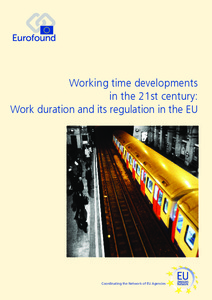Working time developments in the 21st century: work duration and its regulation in the EU
"This report examines the main trends and milestones characterising the evolution of the most important aspects of collectively agreed working time in the European Union during the first decade of the 21st century. Drawing primarily on information collected by Eurofound across all EU Member Sta...
| Main Authors: | , , |
|---|---|
| Institution: | ETUI-European Trade Union Institute |
| Format: | TEXT |
| Language: | English |
| Published: |
Luxembourg
2016
Publications Office of the European Union |
| Subjects: | |
| Online Access: | https://www.labourline.org/KENTIKA-19104053124919222359-Working-time-developments-in-t.htm |
| Summary: | "This report examines the main trends and milestones characterising the evolution of the most important aspects of collectively agreed working time in the European Union during the first decade of the 21st century. Drawing primarily on information collected by Eurofound across all EU Member States and Norway, it focuses in particular on five sectors: chemicals, metalworking, banking, retail and public administration. The report describes the institutional regimes of regulation and assesses the evolution of agreed working hours (hours expected to be spent on work according to collective agreements or agreed between employers and employees) and usual working hours (hours usually spent in practice in work activities) between 1999 and 2014. The report points to the tension that exists between the pressure for decreased working hours in favour of a better work–life balance and fewer health problems for workers and the need for working time flexibility to meet the demands of a modern world economy. An executive summary is available - See Related content." |
|---|---|
| Physical Description: | 93 p. Digital Paper |

